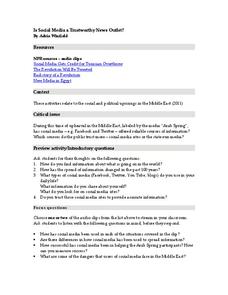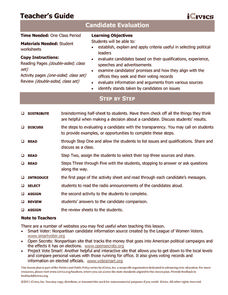Curated OER
Is Social Media a Trustworthy News Outlet?
Examine the role of social media in social and political uprisings. Pupils listen to NPR audio clips about social media and the Arab Spring and read an article that proposes the idea that revolution will not happen through social media....
Kenan Fellows
Farm to Fuel: The Alternative Fuels Industry
Need a lesson to fuel young minds? A variety of hands-on activities is sure to get your class fired up! Beginning with an introductory slideshow and culminating with group presentations, the week-long unit has something for everyone....
iCivics
Candidate Evaluation
How can we decide between candidates on election day? After contemplating various issues and qualities, your learners will go through a step-by-step process of researching and evaluating sample candidates and determining their...
Newseum
Putting the Consumer's Questions to Work
Who, what, when, where, why, and how are good questions to ask when evaluating a source. First, scholars find two sources of information relating to a chosen topic. Next, pupils complete a worksheet to gauge the source's credibility....
Constitutional Rights Foundation
Understanding Fake News
Fake or fact? Learners must decide while looking at two published "news" stories. A reading about why fake news exists and a checklist on how to evaluate sources rounds out the activity.
Curated OER
Neighborhood or Slum? Snapshots of Five Points: 1827-1867
How has your local neighborhood changed throughout recent history? Young researchers evaluate census data, images, and primary source descriptions describing the living situation in the antebellum Five Points neighborhood. They consider...
Curated OER
Comparing SLaves and Servants in Colonial New York
Young historians compare and contrast differences in the laws that regulated the activities of slaves and servants. They review and analyze a series of primary source documents to explain the social constructs related to slaves and...
Curated OER
Create a Magic Lantern Show; Freed People in the Reconstruction South
Engage your scholars by having them create "magic lantern shows" inspired by the film Dr. Toer's Amazing Magic Lantern Show: A Different View of Emancipation. As they study the South's Reconstruction through primary sources, learners...
Curated OER
Who Freed the Slaves During the Civil War?
Pose the question to your historians: who really freed the slaves? They critically assess various arguments, using primary sources as evidence. In small groups, scholars jigsaw 5 primary source documents (linked), and fill out an...
Curated OER
Qualifying to Vote Under Jim Crow
Literacy tests, poll taxes, grandfather laws? Scholars study the systematic ways African-Americans were kept from voting even after it was made a law. They analyze a series of primary source documents, complete a worksheet, and engaged...
Curated OER
Solar Heat: Building and Testing a Solar Oven
Building a solar oven is always an enriching and engaging activity when your class is studying forms of energy or alternative and renewable energy sources. This lesson plan refers you to the re-energy.ca home website for specific...
History with Peters
A Clear Signal for Change: Multiple Interpretations and Nat Turner’s Rebellion
Was Nat Turner a hero or a violent criminal? Using primary sources and images that discuss the rebellion of enslaved people he led in antebellum Virginia, scholars consider the question. Then, they create memorials to Turner and...
Center for History and New Media
Slavery and Free Negroes, 1800 to 1860
What was life like for enslaved and free black people before the American Civil War? Explore the building tension between states and the freedom of individuals with a thorough social studies lesson. Learners of all ages explore primary...
EngageNY
Grade 9 ELA Module 3, Unit 2, Lesson 4
It seems like the first result in a search engine is the best source, but how can you be sure? An activity on assessing sources guides ninth graders through an integral part of their inquiry-based research project, based on questions...
Newseum
Reporting Part I: What Matters to Me
Young reporters have an opportunity to craft a news story about a topic that interests them. Class members brainstorm events and issues that affect them and possible sources of information. Individuals then select a topic, research it,...
Newseum
Propaganda Through History: Analyzing Historical Sources
Working in teams, pairs, or individually, scholars select one resource from a gallery of historical sources and consider which examples might be considered propaganda, the techniques used to persuade audiences, and evaluate how the...
Newseum
Evidence: Do the Facts Hold Up?
Sometimes it's hard to escape bad information! Pupils learn the E.S.C.A.P.E. method for evaluating news sources and complete a worksheet to assess a news article using their new skills.
Newseum
Bias Through History: Analyzing Historical Sources
Young journalists use the E.S.C.A.P.E. (evidence, source, context, audience, purpose, and execution) strategy to evaluate historical and contemporary examples of bias in the news. The class then uses the provided discussion questions to...
Curated OER
Using Primary Source Documents in the Classroom
Students use primary documents to explore the past. They consider the source of the documents and identify and biases that the author may have held. They identify any questions about the historical event that may remain after reading the...
Curated OER
Hamlet Research Paper: Find, Evaluate, and Select Appropriate Research Sources
Help young researchers find credible sources online. Modeling with a Google search for information about Shakespeare’s Macbeth, use a computer projector or Smart Board to show class members how weak the top three search results are....
Stanford University
Hurricane Katrina
The adage says that journalism is the first draft of history. How should people evaluate these sources of information? Taking into account various sources, including those from various perspectives and different creators, learners...
National Endowment for the Humanities
The Gulf of Tonkin Resolution and Escalation of the Vietnam War
The Gulf of Tonkin Resolution propelled America's involvement into a bloody conflict—and it was based on a fallacy. Using the resolution and other documents from the Vietnam War, including declassified documents, young historians...
National WWII Museum
Women and the War: Supporting Historical Interpretations
Rosie the Riveter may be an iconic image from World War II, but not all historians agree on how the conflict affected women in the workplace. Individuals evaluate the writings of well-known historians on the topic, and then decide: Was...
K20 LEARN
Plantation Life And Slavery: Antebellum Era
Learners evaluate primary sources from the antebellum era to determine the accuracy of textbooks. They examine narratives from enslaved people, then compare them to their own text. Extension activities include the opportunity to write a...

























